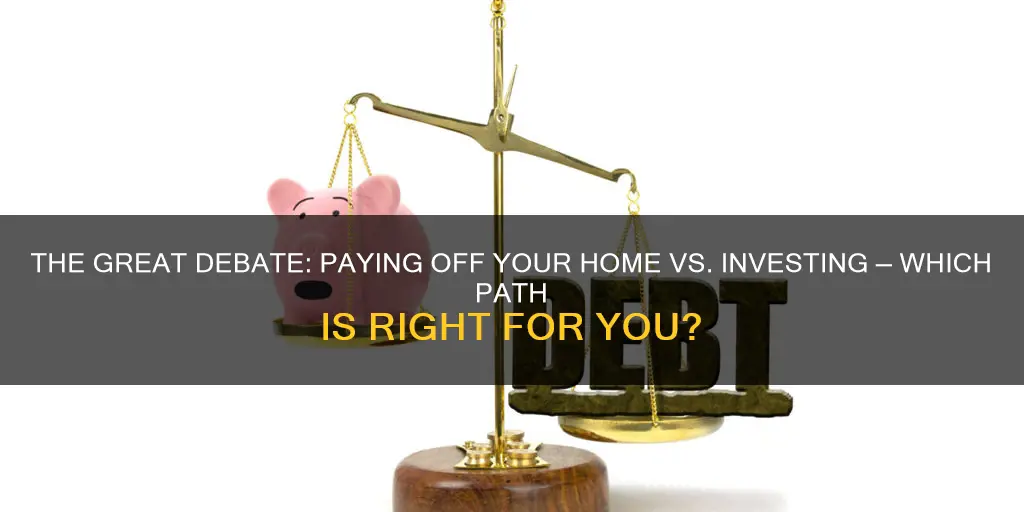
Paying off your mortgage early or investing your money elsewhere is a complex decision that depends on a variety of factors. These include your financial situation, the interest rate on your loan, your risk tolerance, and your proximity to retirement.
From a purely financial perspective, investing your money may be more beneficial than paying off your mortgage early, especially if you can achieve higher returns in the stock market than the interest rate on your mortgage. However, paying off your mortgage early can provide peace of mind, reduce your monthly expenses, and build equity in your home. Ultimately, the decision comes down to your personal preferences and financial goals.
| Characteristics | Values |
|---|---|
| Pros of paying off mortgage early | Eliminates your monthly mortgage payment, freeing up extra funds |
| Saves you thousands of dollars in interest | |
| Provides peace of mind knowing you own your home outright | |
| Offers a predictable rate of return | |
| Allows you to tap the equity in your home if you need money in the future | |
| Cons of paying off mortgage early | Ties up a good chunk of your liquidity and net worth in your home, which might make it harder to access later |
| No longer eligible for the federal mortgage interest tax deduction if you are still claiming it | |
| Could miss out on potential higher returns from other investments | |
| Might not realize as much from your home as you had hoped if the market drops and you have to sell quickly | |
| Pros of investing | Higher returns |
| Liquid investment | |
| If you invest in a retirement account, your employer may offer a match, giving you additional free money | |
| Cons of investing | Higher risk |
| Increased debt |

Peace of mind
Paying off your mortgage early can provide a sense of relief and reduce stress caused by being in debt. It can be especially beneficial for those approaching retirement, as it eliminates a significant monthly expense and allows for better budgeting on a fixed income. This decision may also be appealing to those who are risk-averse, as it is a guaranteed return on investment, unlike other investments that carry the risk of financial losses.
However, it's important to consider the opportunity cost of paying off your mortgage early. By investing your money instead, you could potentially earn higher returns, especially if you invest in the stock market, which has historically outperformed the average returns on mortgages. Investing also provides liquidity, allowing you to easily access your money in case of financial emergencies or investment opportunities.
Ultimately, the decision to pay off your home early or invest depends on your personal financial situation, risk tolerance, and long-term goals. Consult with a financial advisor or certified financial planner to determine the best course of action for your specific circumstances.
Seeking Investors? Ask Confidently
You may want to see also

Opportunity cost
When deciding whether to pay off your mortgage early or invest, it's important to consider the opportunity cost. Opportunity cost refers to the value of the next best alternative that you give up when making a decision. In this case, the opportunity cost of paying off your mortgage early is the potential investment returns you could have earned by investing your money instead.
Potential Higher Returns from Investing
Historically, the average annual return of the stock market has been higher than mortgage rates. For example, the S&P 500 has returned an average of 10% to 11% annually since its inception in 1926. By investing your money instead of paying off your mortgage early, you could potentially earn higher returns.
Liquidity Considerations
Property is an illiquid asset, which means it can take a significant amount of time and effort to convert it into cash. If you invest your money in the stock market or other financial instruments, you generally have easier access to your funds if you need them. This is especially important if you face a financial emergency or want to seize an investment opportunity.
Impact on Other Financial Goals
Paying off your mortgage early may mean sacrificing progress toward other financial goals, such as saving for retirement, building an emergency fund, or pursuing other investment opportunities with higher potential returns. It's important to weigh the opportunity cost of paying off your mortgage early against your overall financial priorities and goals.
Tax Implications
Paying down your mortgage instead of contributing to tax-advantaged retirement accounts may result in losing out on valuable tax benefits. Additionally, if you normally itemize your tax deductions, paying off your mortgage early could cause you to miss out on tax deductions for mortgage interest.
Peace of Mind and Reduced Risk
While investing may offer higher returns, paying off your mortgage early can provide peace of mind and reduce risk. Being debt-free can ease the burden of constant debt and reduce interest expenses. However, it's important to note that investing in a diverse portfolio of assets can also help mitigate risk and provide long-term growth potential.
In conclusion, when considering the opportunity cost of paying off your mortgage early, it's important to weigh the potential benefits of investing your money instead. This includes the potential for higher returns, maintaining liquidity, pursuing other financial goals, and maximizing tax advantages. However, paying off your mortgage early can also provide peace of mind and reduce financial risk. Ultimately, the decision depends on your personal financial situation, risk tolerance, and short-term versus long-term goals.
The NFT Investor Club
You may want to see also

Tax implications
Paying off your mortgage early or investing the money instead has tax implications that should be considered when making a decision.
Paying off your mortgage early means you will no longer be eligible for the federal mortgage interest tax deduction. This deduction can be beneficial, especially for those with high tax rates, as it lowers the amount of tax owed. However, recent changes in tax laws, such as the increased standard deduction, may reduce the impact of this deduction. The Tax Cuts and Jobs Act (TCJA) introduced a limitation on the deductibility of state and local taxes (SALT), allowing only $10,000 to be deducted. Additionally, the new law eliminated the deduction for home equity interest unless the loan proceeds are used for specific purposes, such as "buying, building, or substantially improving" the home. These changes may make the standard deduction more attractive to taxpayers, resulting in a potential loss of the tax benefit associated with mortgage interest.
On the other hand, investing the money instead of paying off your mortgage early may provide tax advantages through tax-advantaged retirement accounts. Investing in a 401(k), traditional IRA, health savings account, or 529 college savings plan can offer tax benefits that may outweigh the loss of the mortgage interest deduction.
It's important to note that investment earnings are taxable, and the tax rates may vary depending on the nature of the earnings, such as income or capital gains. Therefore, it's essential to consider the potential tax implications when deciding between paying off your mortgage early and investing.
Investing During Depressions: Strategies for Success
You may want to see also

Risk tolerance
An investor's risk tolerance is influenced by factors such as age, investment goals, income, and financial obligations. For example, an investor with a mortgage, children, or elderly parents to support may have a lower risk tolerance than someone who is single and has fewer financial commitments.
When deciding between paying off a mortgage early or investing, it is crucial to consider your risk tolerance. Paying off a mortgage early can provide peace of mind and eliminate a significant monthly expense. However, investing offers the potential for higher returns but comes with greater risk and volatility.
If you have a low-risk tolerance, paying off your mortgage early may be a more attractive option. It provides a guaranteed return on investment in the form of interest savings and reduces the overall cost of your mortgage. Additionally, it offers the psychological benefit of being debt-free and can provide a sense of financial security.
On the other hand, if you have a higher risk tolerance, investing may be a more appealing choice. Historical data shows that the stock market has consistently outperformed the average mortgage rate, resulting in potentially higher returns. However, investing in the stock market carries greater risk and volatility. It is important to remember that past performance does not guarantee future results, and there is always the possibility of losing money in the stock market.
Ultimately, the decision to pay off your mortgage early or invest depends on your individual risk tolerance, financial goals, and personal circumstances. It is essential to carefully consider both options and seek professional advice to make an informed decision that aligns with your financial plan and risk tolerance level.
Understanding the Mechanics of Investment Dividend Payouts
You may want to see also

Investment returns
The rate of return is calculated by dividing the dollar return by the initial dollar investment and multiplying by 100. For example, a $200 return on a $1,000 investment would be a 20% RoR.
Returns can be annualized for comparison purposes, and the holding period return calculates the gain or loss during the entire period that an investment was held.
There are two types of returns: nominal and real. Nominal returns are the net profit or loss of an investment in dollar terms, before any adjustments for taxes, fees, dividends, inflation, or any other influence on the amount. Real returns, on the other hand, are adjusted for changes in prices due to inflation or other external factors.
When deciding whether to pay off your home early or invest, it's important to consider the potential returns on your investments. Historical data shows that the S&P 500 has returned an average of 10-11% annually since its inception in 1926 through 2018. This is significantly higher than the average mortgage rate, making a strong case for investing rather than paying off your mortgage early.
However, it's worth noting that past performance does not guarantee future results, and there is volatility in the stock market. As such, investing may not be the best option if you're risk-averse or uncomfortable with the idea of having debt.
Ultimately, the decision to pay off your home early or invest depends on various factors, including your financial situation, risk tolerance, and personal preferences.
Invest Wisely: Today's Guide
You may want to see also
Frequently asked questions
Paying off your home early can provide peace of mind and free up cash flow. It can also save you thousands of dollars in interest.
Paying off your home early may mean missing out on potential higher returns from other investments. It also ties up a good chunk of your liquidity and net worth in your home, making it harder to access later.
Investing may generate higher returns than the loan's interest cost. It also allows you to diversify your portfolio and may provide tax benefits, depending on the type of investment.
Investing in the stock market comes with the risk of losses. It may also be more difficult to access your money if it is tied up in investments.
The right choice depends on your financial situation, risk tolerance, and long-term goals. Consult a financial advisor or certified financial planner to determine the best option for you.







